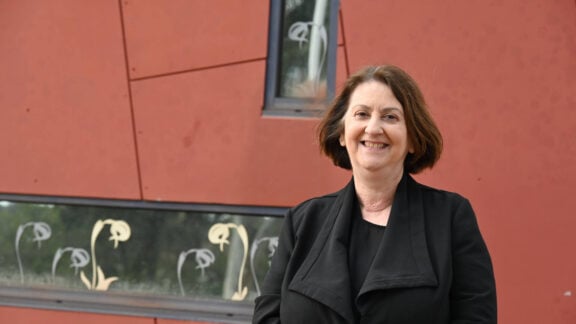Yannis Markopoulos, one of Greece’s the most important composers, whose pioneering compositions paved musical paths over decades, has died at the age of 82.
The great composer, who had been suffering from cancer for the last year, had been admitted on Friday 5 May to the Intensive Care Unit of the Athens General Hospital “Alexandra” after complications.
In the early 1980’s he had toured Australia with a successful string of concerts, organised by Vassilis Eliades with the cooperation of Neos Kosmos. On the tour, Makropoulos had brought with him Dimitra Galani, Charalambos Garganourakis, Vassiki Lavina, Kostas Thomaidis and Chr. Karakostas.
Yannis Markopoulos was born in 1939 in Crete, where he took his first musical lessons in theory and violin, and developed his first influences from the local rhythms with their fast dances and repetitive small motifs, classical music, and the music of the wider eastern Mediterranean, especially Egypt.
In 1956 he continued his studies at the Athens Conservatory, with the composer Georgios Slavos and the violin professor Joseph Bustidui. At the same time he entered Panteion University for social and philosophical studies, which he did not complete, while composing for theatre, cinema and dance.
In 1963 he was awarded a prize at the Thessaloniki Film Festival for his music for the film “Little Venuses” by Nikos Koundouros and in the same year his works “Theseus” (choreography), “Hiroshima” (ballet suite) and “Three Sketches for Dance” were performed by new dance companies.
In 1967, with the imposition of the dictatorship, Yannis Markopoulos went to London, where he enriched his musical knowledge with the English composer Elisabeth Lutyens. He also composed the cosmic cantata “Helios o preotos” (The First Sun), with poetry by Ulysses Elytis, and the music for Aristophanes’ Lysistrata for the Art Theatre, directed by Karolos Koun.
At the same time, he completed the musical ceremony “Behold the Bridegroom”, a work that has remained anecdotal, except for the famous “Zavarakatranemia”, one of his most famous pieces. During the same period he met with fellow composers Iannis Xenakis and Yannis Christou and came into contact with their most innovative musical works.
In London, he also composed the “Christs” for symphony orchestra and the first “Fire Dances A, B, C” (of the 24 he completed in 2001), which were performed in 1968 by the London Concertante Orchestra at the Queen Elizabeth Hall. At that time he also wrote the music for Shakespeare’s “The Tempest”, which was produced by the National Theatre of England, directed by David Jones. He returned to Athens in 1969, with the aim of contributing his works to the march for the restoration of democracy.

As the 1970s dawned, Yannis Markopoulos made a decisive turn in his career. He realised his musical vision, submitting works that are characterised as a whole as a new proposal and a breakthrough for the Greek musical reality up to that time. These are works which, as a whole, have been influenced, in their fundamental principles, by the composer’s aesthetic and philosophical views, but each of them is different. With his compositions he established the essence of musical symbiosis and the correlations of expression between symphonic and local instruments, through his melodic and rhythmic horizon, his harmonic structures and the timbres of his transparent orchestration.
At the same time, he emphatically proposed “Return to the Roots”, meaning “planning for the future by introspection, study and approaching the indestructible sources of the world’s living art and selected contemporary art information”. This proposal took on the dimensions of an art movement. In the same period, his songs such as “Ochtroi”, “Words and Years”, “A Thousand Myriad Waves”, “Lengo” (Greece), “Giant”, “Under the Daisy’s Alonaki”, “Kafeneion Hellas”, “Complaining Words”, “Talking about my children” and many others became symbols and myths. The same occured with his musical works “Free Besieged”, “Stratis the Thalassin among the Agapanthus”, “Helios the First”, “Chronicle”, “Citizenship”, “Plateau”, “Thesis and Immigrants” – in poetry and lyrics by Solomos, Seferis, Elytis, K.H. Myris, Mich. Katsaros, Eleftheriou, Skourtis, Theodorides and his own.
In 1976 he composed the music for the BBC television series “Who pays the Ferryman?” and the theme’s success remained at the top of the British Hit-Parade for months and made the composer internationally famous. In the years that followed, this popularity was expressed with numerous concert invitations where Markopoulos made repeated trips around the world, including New York, Philadelphia, Chicago and San Francisco, Toronto, Montreal, Stockholm, Stockholm, Amsterdam, Amsterdam, Naples, Paris, Berlin, Munich, Munich, Frankfurt, Brussels, London, as well as various cities in Russia and Australia.
In 1980 he was joined in life by singer and collaborator Vasiliki Lavina. Their daughter Eleni was born. For a period the composer sought a more private life with his family, while he began to prepare for the opening of a new chapter in his music: At the core of his new compositions appear melodic outbursts based on the extended polyphony of his harmonic structure – the fruits of his imagination – enhanced by the passion of an inexhaustible vitality.
In 1994 he composed one of his most important works, the “Orpheus Mass” – for voice, choir and orchestra – which philosophically addresses the redefinition of man’s relationship with nature. This is followed by “Renaissance Crete between Venice and the City”, a musical journey in 4 sections, the opera “Herotokritos and Virtue”, “Schemes in Motion”, a piano concerto inspired by Pythagoras, “Euphellenic Landscapes, fantasy for solo flute”, “The Law of Thalassa”, oratorio-musical spectacle for voices, choir, wind orchestra, ballet and images, “16 Pyrrhic Dances 1980-2001”, “Triptych for flute strings and harp” (2007).
It should be noted that Yannis Markopoulos had collaborated with APE-MPE as the musical theme for the news of radio station “Praetorio 104,9”, which broadcasts from Thessaloniki and online.
Markopoulous family: The musical soul of Greece is silenced. But he will remain alive in our memory.
The following statement was issued by the family of Yannis Markopoulos:
“We are sad to announce that this afternoon, after a hard battle with cancer, the great national composer Yannis Markopoulos passed away. The musical soul of Greece has been silenced. But he will remain alive in our memory through his songs, which were and will be sung by generations of Greeks and Greek women.
Details regarding his funeral will follow in a subsequent announcement.
STATEMENTS
Prime Minister Mitsotakis: “Words can only be “lamented” for the loss of composer Yannis Markopoulos. A blow to our culture, which loses a loyal servant. But also for our society and his beloved Crete, which loses a noble figure,” said New Democracy president Kyriakos Mitsotakis in a statement on the loss of Yannis Markopoulos.
Alexis Tsipras: “Yannis Markopoulos was a man of music ahead of his time.”
N. Androulakis : “Greeks bid him farewell with gratitude.”
G. Koumentakis: “One of the last of the generation of great post-war Greek composers.”
L. Avgenakis : “You left for the great journey, but you will always stay with us with your melodies.”
KKE: “It is with deep emotion and respect that we bid farewell to Yannis Markopoulos.”









